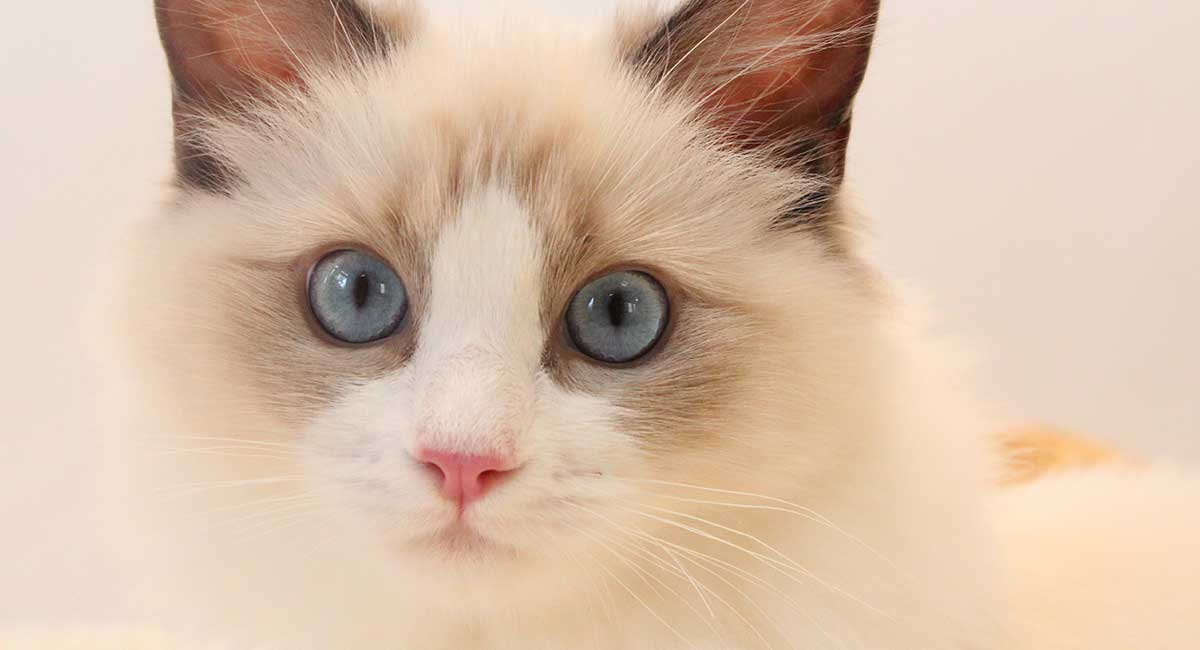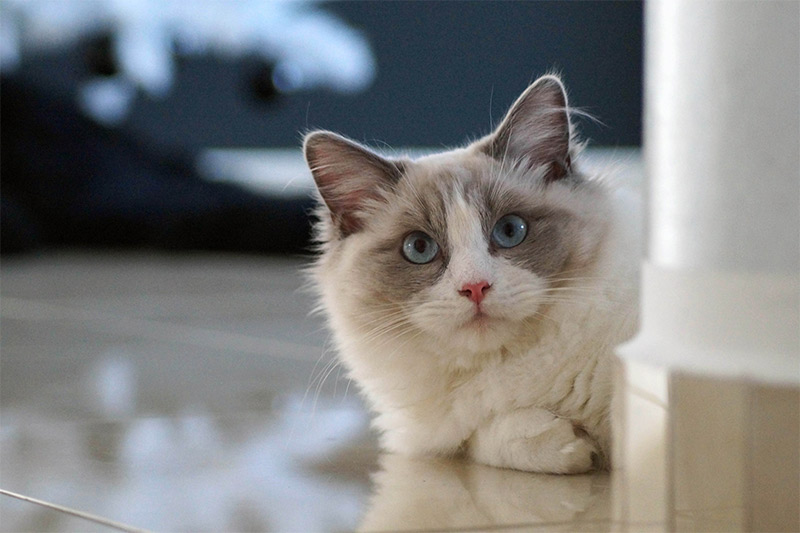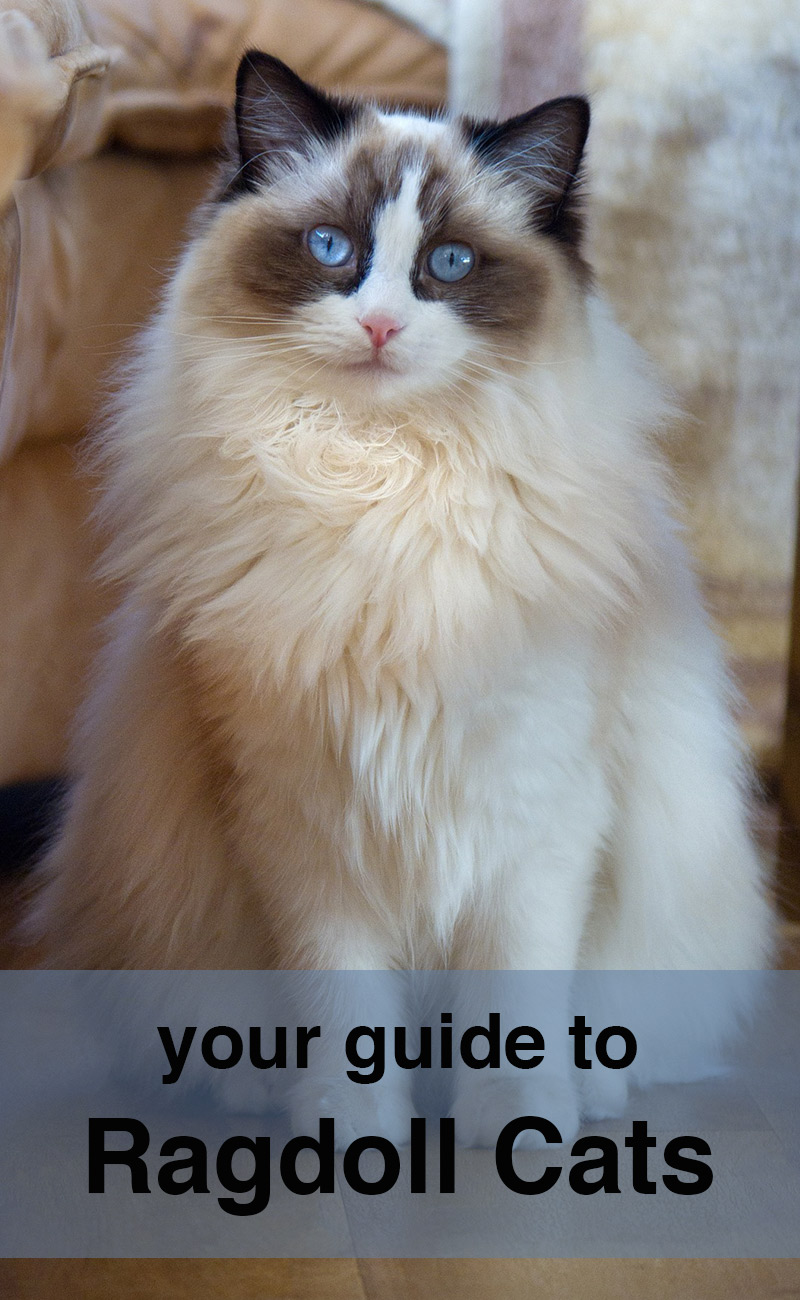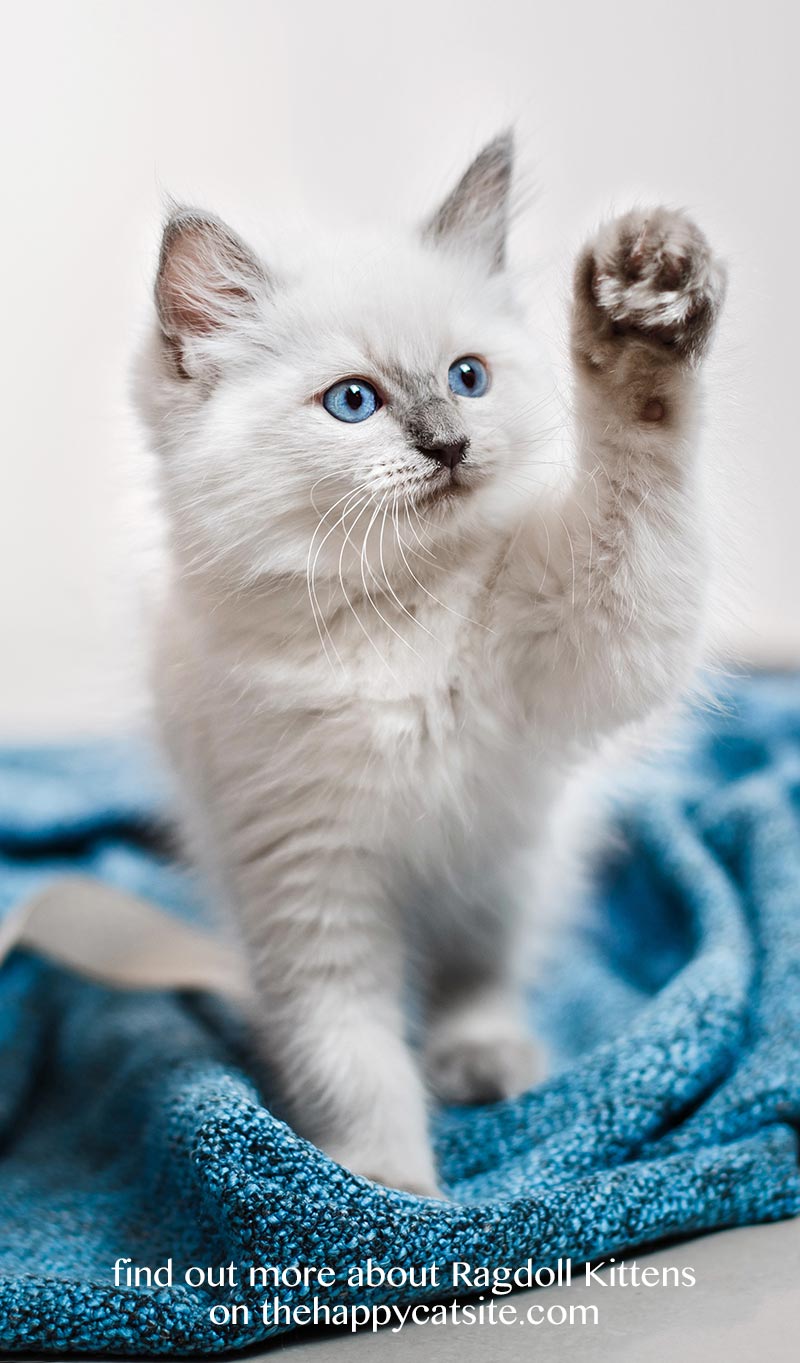
Your Ragdoll cat has an affectionate, docile and sweet-natured temperament. And it’s no surprise, given the name Ragdoll cat is derived from their tendency to flop over in a relaxed manner when picked up. They are masters of relaxation and love to spend time curled up in your bed if not in your arms. However, your Ragdoll’s sociable personality and intelligence also make them even to train, often coming when they are called. This breed are usually good with kids and even get along with most other pets. Their medium length coat sheds less than some other breeds, and they are relatively healthy for a pedigree cat.
Contents
- Typical temperament and behavior
- How big are they?
- Coats, grooming and shedding
- Health and lifespan
- Buying your Ragdoll kitten
Docile And Loving Temperament
Despite a typically loving temperament, your Ragdoll cat is also capable of being independent. As a breed they aren’t overly demanding. Their calm and easy-going natures make them excellent pets.
These cats do have a playful side, especially as kittens. But even their play is gentle, as they don’t tend to extend their claws. They are intelligent cats, who have been clicker trained to perform tricks using positive reinforcement training. Some will even happily have a game of fetch with you.
Are They Family Friendly?
Your Ragdoll cat is likely to be so sociable that hey are even friendly with other cats. As a result, they are sought after pets due to their notorious love of children and other animals.
Although anecdotally, they are exceptionally tolerant of children’s play, even to the point of allowing themselves to be dressed up or pushed around in buggies, remember that every cat has its limits. Young children’s interactions with even the nicest cat should be monitored, for both of their sakes.
Can Ragdoll Cats Go Outside?
Some people believe that cats should be able to employ their natural instincts to prowl and hunt outside. Access to the outdoors gives cats better opportunities for physical exercise and can help prevent boredom. The argument against allowing your Ragdoll cat outside stems from the observation that these social and loving cats tend to be too trusting. Their gentle and affectionate temperament doesn’t arm them with the necessary feline outdoor skills.
They are not territorial and do not usually defend themselves against other cats. This puts your Ragdoll at even more risk of exposure to disease and parasites. Their high resale value and their beautiful coat also make them prime targets for theft if left to wander out on their own.

Size And Weight
Ragdoll cats are one of the largest domestic breeds of cat. Their size is a notable feature of these beautiful animals. They are big, powerfully built, and heavy, cats, with the largest Ragdoll cat, perhaps weighing up to 25 pounds.
Your Ragdoll cat weighs anywhere from 10 to 20 pounds by the time they fully mature at around four years old. The females are usually at the lighter end of the spectrum ranging from 10 to 15 pounds, and the males tend to be on the heavier end weighing from 15 to 20 pounds.
Colors And Coats
Your Ragdoll kittens will be born white, with the first signs of their patterns emerging around ten days old. Don’t go picking a kitten on the basis of their color, because you won’t see their true adult shades until they are at least two years old!
When fully grown, Ragdoll cat coats come in a variety of distinctive colors and patterns. These cats originally came in four colors: seal, chocolate, blue, and lilac. Today their coloring has expanded to also include red and cream. In addition they also come in different pointed patterns including colorpoint, mitted, bicolor and van.
Their fur is silky and soft, made up of guard hairs that are often described as feeling like rabbit fur. The lack of an undercoat gives them a very fluffy appearance. They also have a distinctive ruff of fluff around their neck.
Ragdoll Cat Care
The beautiful Ragdoll coat requires a moderate level of upkeep. These fluffy kitties should be brushed from once to twice a week with a steel comb to remove tangles and any loose hair.
They are moderate shedders, mostly with a change of the seasons. However, due to their lack of an undercoat, they will spread less fur around your home than many other cat breeds.
You can help to care for your Ragdoll cat by paying attention to the cleanliness of their litter box. Removing the waste immediately after they have produced it will reduce the chances of it catching in their coat.
Are Ragdoll Cats Hypoallergenic?
Allergy free cats are sadly a thing of fantasy, with all breeds producing the allergens that some humans react to in their saliva and on their coats.
Potential Health Problems
Ragdoll cats tend to be quite healthy and have the potential for a long lifespan, but like most pedigree breeds they do have a genetic predisposition to some issues. Heart, kidney and urinary tract diseases are not uncommon. Cryptococcosis and Feline Infectious Peritonitis also need to be watched out for.
However, your Ragdoll cat has a good life expectancy and can live anywhere from 15 to 20 years. The odds of a long life are increased if you buy a kitten from health tested parents.
Ragdoll Cat Breeders
A reputable breeder should be happy to answer all of your questions and provide certificates for any genetic testing that has been done.
You are looking at spending anywhere from $600 to $1,800 for your Ragdoll kitten, depending on the state you are living in. It is also worth bearing in mind that if you are looking to buy a kitten with the breeding rights, you may have to pay twice this much money.
An adult Ragdoll available for sale will either be being sold by a showing enthusiast who is retiring it or due to a family’s change in circumstances.


I love the look of the ragdoll cats. I know my wife would love one. Her birthday is coming up pretty soon. She would love it if I got her one for her birthday. The best part about them for me is that they have a sweet nature and kind demeanour. That would make a great addition to our home.
Jon, I can say from experience that adding a Ragdoll to your life will bring much love, joy, and laughter. They’re a joy from the beginning and, as they continue to mature physically, their purrsonalities continue to evolve and so does your relationship with them. They’re all very similar but still unique and their genetics have produced a very trusting and sweet cat that still retains some instincts…a lovely combination. I can’t imagine not sharing my life with a Ragdoll.
Definately much joy and laughter! I have 2 Ragdolls. My male is sweet and has a soft little “chirp for a meow. The female is a goofball and she goes around yodeling at night. She’s a loud mouth and hates to be held. Actually they both hate to be held. They both follow me around, are nosey and really curious of running water. I love my fluffballs. It takes abt 3 yrs for a Ragdoll to completely blossom into their full size, fluff and colors. So beautiful!
I have a male that chirps like that, but he also a goofball ball sometimes he evens runs into things like the tub. He does not like being hel but flops when you pick him. He keeps getting more friendly.
Hi
Raggies will suffer if they are left alone so consider their plight if you are out all day and they are on their own. Maybe buy 2
Also our beautiful Ringo died of HCM within 2 hours so be aware of the problems
They make fantastic companions. Heavenlyrags.net
i would like to know how i can get a pet quality ragdoll kitten my mother has one and i just love the cat,he is so beautiful and so sweet and friendly. please reply if youknow of a breeder that has ragdoll kittens thati coukd buy as a pet ,i don’t want to breed them.please reply to me. Thank you.
Google is your friend ?
Try googling Ragdoll breeders, there seem to be breeders in most states. Often you will have to be willing to put your name on a wait list and possibly make a deposit. They are well worth the wait.
We are told never to leave a deposit, unfortunately due to rogue breeders.
Well I live in the UK, and I got mine from a breeder who used to live in America, she lives near scunthorpe, I think it’s Brigg she lives in, she is a really good breeder, she takes good care of them and they are all genuine, they cost £450 (excluding the £100 deposit)
I’m just seeing this post. Did you find a Ragdoll? They’re wonderful pets. We have one, a 3 yr old ‘retired’ male breeder. He was fixed before we brought him home. Best boy ever! We are looking to buy a kitten from the same, ethical breeder. We like she doesn’t keep them for years and years, breeding them. Our baby is the daddy to three litters. Google Bee Cave Ragdolls in Texas. Dawn is great!
My daughter has been wanting a kitten for a while now, and we thought with her birthday coming up it would be the right time to get her one. The breed we have been looking is the ragdoll cats, but we are curious to know how to find the right one for us. It’s good to know that when it comes to finding a breeder of this specific type of cat, that we want to find one that makes sure that both parents are fully health tested. Which will be great to know that the kitten we choose will have a healthy start to life.
Most breeders in my area guarantee their kittens for one year.
Many breeders are very particular about who is purchasing their kittens, even having you fill out a detailed application and make a deposit, often not returnable. These cats are expensive, but well worth the expense. If you look up TICA Cat Show winners, you can find names of breeders. The litters that I have had experience with have both pet quality and breeder quality kittens. In my area, kittens purchased for pet quality are neutered. To buy a cat that can be bred is very expensive, I think because this is considered breeder quality in order to sell kittens.
As a Ragdoll Breeder,I can say Pet quality to us is mismark in pattern.Dark freckle on a foot(Hawk Spots)A not so perfectly placed V on a Bicolored.Tiny mitt’s on the mitted rather than full and symmetrical.There can be many variations of these babies.We do place all our Kitten Altered as well.Only a Kitten as perfect as we can get it is placed as a Breeder unaltered.
I have a ragdoll of my own and we wanted to do more research on his breed and we were very confused because we have an all black ragdoll and on the breeds, it doesn’t say there are
Correct, solid black is not a Ragdoll color or pattern. You most likely have a Ragamuffin, which is an outcross of the Ragdoll with another breed.
The sixth photo down (the portrait shot of a blue bi-colour) is my photo, of my cat. I don’t mind my photos being used if people ask first, but to just lift a photo and use it without asking is simply rude.
Please ask in future!
Hi Jules, I’m very sorry to hear this. That photo was downloaded from a stock image site called Pixabay, who claim to own the copyright and allowed us use of the image. I recommend you contact them if you believe you actually own the copyright, to request it be removed. I have removed it from our site in the meantime. Best wishes, Lucy
I love my Ragdoll, Pegasus who is a retired supreme grand champion and breeder, that I was fortunate enough to acquire from his owner through a good friend. I have had a lot of cats as pets usually strays or rescued, that have been family members, but not even close to the love and affection you get from a ragdoll. They are a true people cat and love to be around their owners. Pegasus has truly brought me many blessings and joy to my life in a trying time. I love myRagdoll.
Hi Michelle
I hope you and Pegasus will have many happy years together, it’s truly amazing the bond you build with a raggie.
I’d just like to say that owning, or I’ll rephrase that…. Being owned by a ragdoll is one of life’s pleasures.
This breed is the most loyal and devoted friend you will ever have.
Sadly I’ve just lost my old boy Rags, who was 14yrs old and has been an awful loss to our family.
He grew up with my children and was always there for a cuddle when needed. He was such a sensitive wee soul and we have him buried in our garden so he is always near.
We have recently welcomed a new baby ragdoll named Tuco who is now 12 weeks old. its been a long time since we’ve had a kitten around, and he certainly keeps us on our toes.
We just couldn’t imagine not sharing our lives with a raggie.
If you are thinking of acquiring a ragdoll, please go to a reputable breeder.
It certainly is a privilege to be owned and servant to one of these amazing creatures.
The price of Ragdoll cats have skyrocketed in recent years.
Some will claim it’s the increased cost of vet. services. To an extent sure, but that doesn’t explain the 2-3x increase in price over a 3 year time span.
It’s laughable to the point of looking at other breeds that fit the personality of a Ragdoll.
Many breeder’s websites now won’t even list the price of their Ragdolls, which speaks volumes. When I’m interested in another cat it will likely be a different breed that is fairly priced. They have become far too greedy for a cat who’s personality can easily be found in many other long haired cat varieties including Maine Coons.
Oh and by the way – my purebred female Ragdoll cat, while loves to be in close proximity to me, or on my chest, does NOT like being held.
So – not all Ragdolls will display the floppy cat disposition.
My sweet boy will be 18 in a couple of months. He is my first pet cat. Before Pavarotti all my pets have been dogs, mostly small cuddle type dogs. I was leery if I would enjoy the cat connection. I love this guy more than I can say. At his age I fear I will lose him anytime. He is in good health, always been an indoor cat. But still I worry. My husband has already told me I can’t get another Rag, too expensive. Living on our retirement funds don’t allow for expensive pets. But I love my Rag Doll. I dream about finding a breeder who has some retired queens in need of a good home with super low pricing. I have a vivid imagination!
I just want every one to know there is no more loving cat than a much loved Rag Doll. By the way, my Pavy is a chocolate bi color and beautiful.
Hi we have a 12 week old ragdoll kitten and while playing she can get quite rough and bite. These are playful bites but I would like to know if she will outgrow this habit or what we can do to get her out the habit.
Hi Angela, This article will hopefully help: https://www.thehappycatsite.com/kitten-biting/
I have more of a question, or two about our Ragdoll who is now almost two years old.
I have assembled a cat run in our back garden which she loves so much she meows to get into very often just after dawn! Darcey has a petplan insurance and regular visits to our Vet. However, on occasion Darcey appears to ‘protest’ by peeing on the floor corner if she is not immediately allowed outside. How can we correct this behaviour? We recently spent a great deal of money on hardwood flooring. But we do love Darcey to bits and would not ever consider rehoming her. Can anyone help, please?….
I have a 7 year old ragdoll, who I absolutely adore. Would it be good or bad to bring in a ragdoll kitten at this stage of her life?
Only just seen your question, so you must have made your decision long ago.
So for others who may have the same question…yes, go for it! I have several times brought a new kitten into my home where an older ‘raggie’ already lives, and they have always been welcomed if of the opposite sex, and tolerated if of the same sex. A boy and a girl will absolutely adore each other, whereas three girls (in my case) aged 10, 2 and 4 months, all respected each others’ space. Have fun!
I have a rag doll but its pure white,can i ask anybody f my cat is a pure breed?thanks and god bless
A wonderful cat breed. I have had Miss Kitty for 15 years and she has been a quiet, calm and pleasantly playful companion.
My wife and I have a 9-year-old, 18-pound furball whose mother was a registered Ragdoll and father was from the wrong side of the tracks… 🙂 Physically, he shows every sign of being a “pure” Ragdoll, except for his eyes – a deep green amber – and his personality: he hates to be picked up. On the other hand, he loves to curl up with (or on) one or both of us, and has slept with us since the first night we brought him home. He’s also quite “talky” – always greets me at the door to tell me about his day, and whenever I call home from work, he loves to stick his face right in my wife’s phone and go, “HI!!”
Colorwise, I looked through the Ragdoll pages on several cat-fancier sites and finally decided that he’s “Bicolor Mink Seal with Lynx overlay”… He also has better manners than a lot of human adults I know, and he’s scary smart.
Yeah, he’s spoiled rotten. What gave it away? 😀
I have what I assume is a crossbred ragdoll cat. Looks exactly like one but came from a brindle mama. My ragdoll is called Icy. Icy just gave birth to two kittens only. The darker one died. The remaining One is a ragdoll. Icy is not producing milk. The new kitten is one week old. Trying to feed it with a milk supplement but it will not take to the bottle. Tried squirting the supplement onto Icys nipple but she licks it off before the kitten can’t get any. Any suggestions would be gratefully appreciated thank you
One of my friends is a cat lover and since she moved to her new apartment around 1 year ago she hasn´t had one. I loved that you said Ragdoll cats have a very charming, have a loving personality and want to spend time with others. My friend is pregnant so having a caring cat like this will be great for both her baby and cat´s relationship.
I have just put a deposit down on 2 ragdoll kittens. Was overwhelmed by the wonderful temperament s. One of the kittens only has markings over one ear and one eye. Having since looked at pictures of ragdoll s they all seem to have very symmetrical markings. Can you advise if this is normal or not?
My daughter adopted a 7 year old Ragdoll cat from a shelter a week ago (he had been there for 3 months). He is exactly as you describe. Very sweet, affectionate, vocal, trills, purrs, plays, and is a great cuddler. However, he does have 2 issues, spraying and excessive humping behavior (20 minutes a session and at least 10 times a day). He uses his litter box without fail, although he did not appear to be urinating in it for the first 3 days. He is eating and drinking fine. Our daughter lives by herself and doesn’t have any other pets, nor have their been pets in this house since being fully gutted and remodeled It had been a hoarder house so the renovation involved taking it down to the studs, removing all plaster and wallboard, sanding hardwood floors, removing all tile. I’m mentioning this in case cats can be sensitive enough to smells that they would be able to pick it up the “history” of this house. Additionally, there are no neighborhood cats within 500+ feet.
The family member surrendering him reported that their vet said he “did not have testicles”. The vet at the shelter opted to do an extensive exploratory surgery and discovered one shriveled testicle but could not find a second one. He does not have spikes on his penis and we are told this is an indication that testosterone is not driving his spraying and humping behaviors. The shelter seemed surprised that he was exhibiting these behaviors. The shelter vet is going to evaluate him for a UTI or urinary blockage. Our questions: Could a UTI or blockage explain either or both of these behaviors? If he does not have a medical reason for the behaviors, presumably this means they are behavioral issues. Either way, what is the chance that one or both of them can be extinguished? Our daughter really loves this kitty already and is willing to work with the humping issue, but is not confident she can deal with the spraying if it is unlikely to be extinguished. Any advice would be much appreciated!